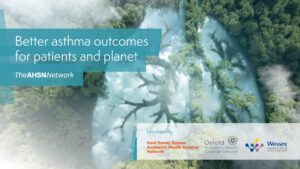 The Kent Surrey Sussex (KSS), Oxford and Wessex AHSNs have created a practical guide for healthcare professionals working in the respiratory field which aims to benefit patients and reduce the environmental impact of asthma treatments. It contains information on reducing the carbon footprint of inhalers, optimising effective inhaler prescribing, identifying severe asthma and more.[1]
The Kent Surrey Sussex (KSS), Oxford and Wessex AHSNs have created a practical guide for healthcare professionals working in the respiratory field which aims to benefit patients and reduce the environmental impact of asthma treatments. It contains information on reducing the carbon footprint of inhalers, optimising effective inhaler prescribing, identifying severe asthma and more.[1]
Respiratory care itself has an impact on the environment. When the NHS became the world’s first health system to set ‘net zero’ targets ‘ in 2020[2], one of the focus areas was the use of inhalers. Inhaler emissions account for approximately 3% of the NHS’s carbon footprint (and as high as 13% in primary care). The propellant used in metered dose inhalers (MDIs) accounts for most of this. Yet greener alternative inhalers are available, such as dry powder inhalers (DPIs).
The NHS has an opportunity to not only improve the quality of care for individual patients but also to demonstrate responsible stewardship of the environment which will benefit everyone. This toolkit supports making this happen.
[1] The resources identified in this document are some of the options available to support respiratory professionals. Other resources may also be available; this list is not exhaustive.
[2] The NHS has set two net zero targets. For emissions the NHS controls directly, their target is 2040. For emissions the NHS can only influence, but not control, their target is 2045.

